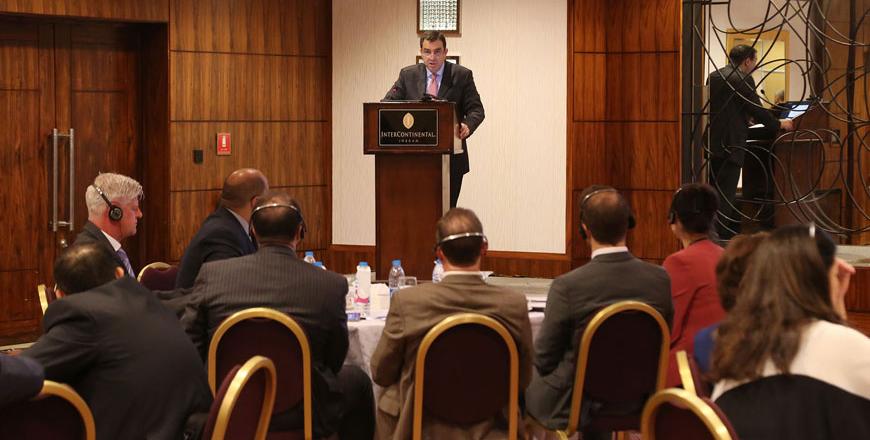You are here
World Bank offers up to $1.4b in easy credit to Jordan
By Khetam Malkawi - Jul 22,2016 - Last updated at Jul 22,2016

Minister of Planning and International Cooperation Imad Fakhoury speaks during the launch of 2017-2022 country partnership framework between Jordan and the World Bank on Thursday (Photo courtesy of Planning Ministry)
AMMAN — The World Bank (WB) has endorsed the 2017-2022 country partnership framework, offering up to $1.4 billion of financing to Jordan for the coming six years, officials from both sides announced on Thursday.
The announcement was made at a press conference in Amman, where Ferid Belhaj, the World Bank Group director for the Middle East Department, noted that this is the largest programme in the history of the World Bank’s engagement with Jordan.
Recognising pressure on the Kingdom’s economy and service facilities from hosting a large number of refugees and the impact of closure of Jordan’s borders with Syria and Iraq, Belhaj expressed the WB’s commitment to continuous support for the country, stressing that “Jordan will not be walking alone”.
Minister of Planning and International Cooperation Imad Fakhoury said the country framework was adopted unanimously by the 25 members that represent the region on the WB board.
“It offers $1.4 billion of financing to Jordan if we want to take it. So we make our decisions based on our needs and requirements,” Fakhoury told The Jordan Times on the sidelines of the conference.
He noted that the framework is very focused on addressing the short-term vulnerabilities of Jordan to respond to the Syria crisis, adding that Jordan also needs to focus on the priorities set in the Jordan 2025 economic blueprint.
The country framework takes into consideration two aspects, Fakhoury explained, the first of which is related to enhancing the growth of the private sector and increasing its competitiveness, improving the investment climate and securing micro, small and medium enterprises access to financing.
The second pillar has to do with enhancing the government services all across Jordan. “This is related to making sure that we improve the quality of government services, health and education, municipal services, transport… and making sure we strengthen areas where [our performance is] weaker,” the minister added, stressing that these are identical with the government’s priorities.
The International Finance Corporation (IFC) programme has grown from $70 million in 2007 to almost $1.4 billion now, which makes it the second largest programme in the region after Egypt, he noted.
Jordan has been pushing for a change in international assistance policy, pushing the World Bank and the global community to allow it to borrow under the same easier conditions applied to low-income countries, although the Kingdom falls under the category of middle-income states.
The first batch of loans includes a $300 million package at an interest rate under 1 per cent and is expected to be finalised in October.
The World Bank is scheduled to discuss the loan for approval after two months and the funds will be earmarked to finance a programme aimed to attract investors, reform the labour market and grant Syrians access to the workforce in Jordan.
Tania Meyer, World Bank’s country officer in Jordan, said this first loan targets the labour market, seeking to raise the number of work permits issued to Syrians, in addition to improving the business environment.
“We are looking at the predictability of the business environment, which is a key constraint to investment in Jordan,” she told The Jordan Times on the sidelines of the press conference.
“We are proposing that the government of Jordan establishes a predictability framework for business regulations. This will send a strong signal to investors outside and inside that the business environment is going to stabilise,” she added.
According to Meyer, the operation will be presented to the WB board of directors in the fall, and a number of prior actions will have already been achieved between now and then. Further reforms will be supported over the course of project implementation in the next four years.
A critical aspect to this operation, she noted, is the need for a robust public-private dialogue to identify key constraints to investors’ confidence and agree on reform priorities to bolster the business climate.
In the coming months, the WB and the government will be discussing a number of projects to be launched in support of the implementation of the new Country Partnership Framework (CPF) in the education, energy, water, private sector development, local development and access to finance sectors.
“This CPF re-confirms the [World Bank’]s commitment to Jordan in these difficult times for the country and the rest of the region. We have reached unprecedented levels of engagement with Jordan, and are moving ahead decisively with the implementation of this new strategy,” Meyer added.
Related Articles
AMMAN — The World Bank (WB) will provide Jordan with $250 million in August as part of $500 million in concessional financing to support Jor
Planning Minister Imad Fakhoury on Wednesday met with World Bank Director for the Middle East Ferid Belhaj to discuss present and future collaboration between Jordan and the World Bank.
AMMAN — Finance Minister Omar Malhas on Wednesday met with Eric Meyer, deputy assistant secretary for Africa and the Middle East at the US t















